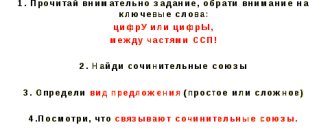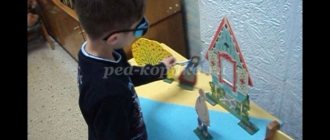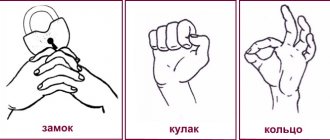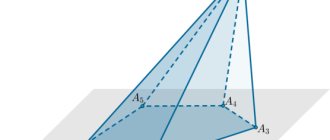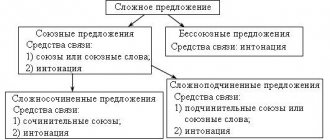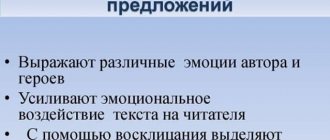Exercises on the topic “Complex sentences”
SPP1 . Rewrite the sentences, inserting the missing characters and letters. Highlight grammatical basics. Describe each proposal.
1. I was about to get up when suddenly my eyes stopped on a (stationary) human image.
2. I looked...it was a young beautiful girl.
3. She sat twenty steps away from me, thoughtfully lowering her head and dropping her hands on her knees.
4. And the far left bank (still) was drowning in darkness and the darkness drew huge (im)constructed figures there.
SPP2 . Rewrite the sentences using punctuation marks. Highlight grammatical basics. Ask a question for each subordinate clause and indicate its type .
1. In the evening I met a friend who was already waiting for me in the cafe where we agreed to see each other.
2. At the hour when the sun rises, the birds sing louder.
3. He masterfully showed how the stream makes noise and how the wind blows.
4. We didn’t ask what he was afraid of and what he expected from the upcoming concert.
5. When I opened the window, my room was filled with the smell of flowers in the meadow outside my window.
6. The student prepared for the test as the teacher advised.
7. We are sailing at random because the darkness seems even thicker after lightning.
8. Everywhere where the forest was thinner, shadows lay on the ground.
9. The Cossack has such a horse that he knows the way everywhere.
10. A person cannot live if he does not believe in tomorrow's happiness.
11. While you are dreaming about work, you are soaring like an eagle.
12. Ivan Ivanovich came hunting to get some fresh air.
SPP3 . Rewrite the sentences, inserting the missing characters and letters. Highlight grammatical basics. Indicate the types of subordinate clauses.
1. The best share goes to the one who strives...to success.
2. She was watching us and definitely wanted to find out what we intended to do.
3. What I’m waiting for (I don’t) know myself.
4. He asked if there were any orders and disappeared.
5. I (can’t) definitely say that we liked walking barefoot more or feeling the freedom.
6. I lay on the bed listening to the rain drumming.
7. In the morning the sun had not yet risen... we left the village.
8. Learned by bitter experience, I realized that this path was brutal and turned off it.
9. The path rises into the rocks where red pines look into the sky and falls into moss swamps.
10. I ran up the stairs..that led to the sun..litsa and entered..l into the room.
11. She gave me a sign to wait and went out.
12. I look (into) the distance where the silhouettes of ships are visible and I see mi...ions of lights.
13. He looked out the window and when the carriage drove away he turned to his wife with an exclamation.
14. I didn’t know where to step and was left completely alone in an unfamiliar crowd.
15. I believe that all the kings want us to accept the Turkish faith.
16. (It’s not) good that all your patients smoke such strong tobacco that you always sneeze when you enter.
17. You thought that I would listen quietly... about insolence because (because) I don’t have money that I could throw on the table.
18. I forgot to say that the governor was terribly happy when they announced to him that we were leaving.
SPP4 . Rewrite the sentences, inserting the missing characters and letters. Highlight grammatical basics. Indicate the types of subordinate clauses.
- Everyone said that I had changed... that I had grown up and become wiser.
- Savich came to me to say that the last boat was heading ashore and that I was in a hurry.
- At the same time, the thought flashed through my mind that I was hiding and that my mother would not see my tears.
- There was an old house where my grandfather lived (not..) and where all my aunts and my father were born.
- Ra...tell me exactly what he is like and what kind of person he is.
- The mother said that she was tired of lying down and that she wanted to sit down.
- They fled to Zaporozhye if they knew how to find their way and if they were not intercepted on the way.
- You should see it in the summer when all the trees are covered with fruits and when all my twenty birthdays are playing.
- I want to tell you the story of a woman that you all saw and which (n..) some of you (n..) knew.
SPP5 . Rewrite the sentences, inserting the missing characters at the junction of conjunctions. Highlight grammatical basics. Indicate the types of subordinate clauses.
1. It so happened that when we were driving there was not the slightest swell.
2. I was sure that if he was needed, he would come right away.
3. I remained silent because although I knew a lot, I didn’t want a quarrel.
4. He knew that if he extended his hand, dew would fall from the bushes.
5. He answered that if it had not been for him, no one would have been saved.
SPP6 . First write down sentences with conjunctions, then sentences with conjunctions. Fill in the missing letters and punctuation marks. Highlight grammatical basics. Indicate the types of subordinate clauses .
1) I fell in love with this small outlying street and was sure that it was the most picturesque. (K. Paustovsky)
2) If life deceives you..t (n..)sad (n..)angry! (A. Pushkin)
3) In a birch forest it is always brighter (as) the birches themselves glow with a quiet light and illuminate the space around them. (V. Soloukhin)
4) I love your life and want you to become better. (K. Vanshenkin)
5) We need a small jug so that the little genie can fit in.. it becomes clever in it.. it suddenly grows like fire above the jug.. to become a real genie! (G. Lyakhovitskaya)
6) He who is quick with words rarely argues in business. (Proverb)
7) Life, do you remember the soldiers who died protecting you? (K. Vanshenkin)
 What is written... with a pen cannot be cut out... with an axe. (Proverb)
What is written... with a pen cannot be cut out... with an axe. (Proverb)
9) Like the shepherd, like the flock. (Proverb)
10) Feeling hungry, I went into the restaurant and began to think about what I should order.
11) Who can know what awaits me? (A. Pushkin)
12) Some sounds were coming from the river, as if someone’s mighty yearning chest was quietly groaning. (M. Gorky)
SPP7. Rewrite the sentences by inserting the missing letters and symbols. Highlight grammatical basics. Determine the types of subordinate clauses and methods of subordination.
..here our hero (voluntarily) stepped back and looked...at him intently. He happened to see..t (n..)few all kinds of people, even such as the reader and I may (n..)when (n..) will (?) see, but he has yet (n..) seen such people (n..) .)seen. The face of the landowner (n..) looked like (n..) what special.. it was almost the same as that of many thin old men, one chin only protruded very far.. far (in ) in front so that every time he had to cover it with a blanket so as not to spit. Small eyes ran from (under) high eyebrows like mice when, sticking out of dark holes with sharp muzzles, ears pricked and whiskers blinking, they look (n..) to see if the cat is hiding somewhere or boy (naughty). G..much more beautiful was his attire (n..) by what means and materials (it was) impossible to find out (?) from what his robe was made; the sleeves and floors were so greasy that they stank What kind of yuft is used for boots (from) behind (in) the place of two there were four floors dangling from which cotton paper climbed in flakes. He had a bandage around his neck... about something that (it was) impossible to make out whether it was a stocking, a garter, or a belly just (n..) like a (n..) tie. In a word, if Chichikov had met him somewhere at the church door, he would probably have given him a copper penny. But in front of him stood a (n..) beggar, in front of him stood a landowner... and this landowner had a thousand (and) more souls (?)
(According to N.V. Gogol)
SPP8. First write down sentences with subordinating conjunctions, and then with connecting words. Place punctuation marks.
1) I fell in love with this small outlying street and was sure that it was the most picturesque. (K. Paustovsky) 2) What I’m telling you quietly looks like sleeping distances. (B. Pasternak) 3) In a birch forest it is always lighter, as if the birches themselves glow with a quiet light and illuminate the space around them. (V. Soloukhin) 4) I love your life and want you to become better. (K. Vanshenkin) 5) I am sure that the strawberry aroma cannot be confused with anything else. (V. Soloukhin) 6) He who is quick with words rarely argues in business. (Proverb) 7) It was clear that we had to hurry. What is written with a pen cannot be cut out with an axe. (Proverb) 9) Like the shepherd, like the flock. (Proverb)
(K. Paustovsky) 2) What I’m telling you quietly looks like sleeping distances. (B. Pasternak) 3) In a birch forest it is always lighter, as if the birches themselves glow with a quiet light and illuminate the space around them. (V. Soloukhin) 4) I love your life and want you to become better. (K. Vanshenkin) 5) I am sure that the strawberry aroma cannot be confused with anything else. (V. Soloukhin) 6) He who is quick with words rarely argues in business. (Proverb) 7) It was clear that we had to hurry. What is written with a pen cannot be cut out with an axe. (Proverb) 9) Like the shepherd, like the flock. (Proverb)
SPP9. Write down complex sentences, observing spelling and punctuation standards. Make diagrams. Determine whether the parts in each sentence are connected by a conjunction or a conjunctive word.
1) Masha squeezed his hand so friendly and tightly that his heart beat with joy. (I. Turgenev) 2) Whatever fell from the cart fell.. fell. (Proverb) 3) (There was no hope) that the sky would wake up. (A. Chekhov) 4) Marina fell in love with Verochka and knew how to guess from her eyes what she liked. (I. Goncharov) 5) In Andersen’s complex bi..graphy, it is (not) easy to establish the time when he began to write his first pr..forest..skates..s. (K. Paustovsky) 6) He spoke about the times of...the future when peoples of discord formed into a great family with..d..nya(tsya, tsya). (A. Pushkin) 7) The journey..process..the (n..)showed him such horror..but as he expected..it was. (A. Pushkin) This blind man (n..) is as blind as he seems. (M. Lermontov)
(I. Turgenev) 2) Whatever fell from the cart fell.. fell. (Proverb) 3) (There was no hope) that the sky would wake up. (A. Chekhov) 4) Marina fell in love with Verochka and knew how to guess from her eyes what she liked. (I. Goncharov) 5) In Andersen’s complex bi..graphy, it is (not) easy to establish the time when he began to write his first pr..forest..skates..s. (K. Paustovsky) 6) He spoke about the times of...the future when peoples of discord formed into a great family with..d..nya(tsya, tsya). (A. Pushkin) 7) The journey..process..the (n..)showed him such horror..but as he expected..it was. (A. Pushkin) This blind man (n..) is as blind as he seems. (M. Lermontov)
SPP10. Compose and write complex sentences using these demonstrative words, as well as conjunctions and allied words.
1) The one who...,.... 2)…to the one who…. 3)… such…, which…. 4)… where….
SPP11. Convert complex sentences into complex sentences. Compare syntactic synonyms and draw a conclusion. Parse the third sentence.
1) The lesson began, and the students began to do independent work. 2) The written exam in the Russian language ended, and the ninth graders began to eagerly await the results. 3) It became stuffy in the audience, and we had to open the window.
SPP12. Write it down, separating subordinate clauses with commas. Indicate means of communication in complex sentences: enclose conjunctions in an oval, underline allied words as members of the sentence.
1. I knew that in the morning my mother would go to the field to reap rye. I really wanted to go to the harvest with my mother and I was afraid that I would oversleep and that she might leave me.
2. The mere feeling of having slept well is enjoying life. I unconsciously enjoyed this and I had a vague feeling of something else very interesting and good that awaited me in the future.
3. No matter how rich the subsequent life may be, the memories of childhood cannot be compared with anything. I'm trying to find where and when certain spiritual qualities or (dis)advantages were born in me.
4. Childhood is the brightest time for a person. Everything connected... with childhood seems... beautiful. A person’s childhood is not.. playing with dolls or soldiers, but the period of life is quite harsh and responsible because..in childhood a person’s character is formed..in childhood it is learned.. all sorts of unexpected things that can break the thread of life. What is scary for an apple tree... is scary for a grown strong apple tree. (V. Soloukhin)
SPP13. Write it down using missing commas. Determine the case of relative pronouns acting as allied words. Underline the connecting words as parts of the sentence.
1. The cloud...turned into a white cloud that...rose heavily, grew and gradually...covered the entire sky. (A. Pushkin) 2. The old man was unable to answer what he would do with the treasure. (A. Chekhov) 3. How... the hurricane was furious, it weakened... the shaft. (M. Bulgakov) 4. I want to know how it’s done..... 5. I am the one whose gaze destroys hope as soon as hope blossoms. I am the one whom no one loves and curses everything living. (M. Lermontov) 6. Damn... the sound that happens when sheet iron is thrown from a truck onto the ground. (M. Bulgakov) 7. It is not the one who climbs into danger..feeling fear..that is courageous, but the one who can..suppress the strongest fear and think about the danger..n. ...submitting to fear. (K. Ushinsky) 8. What you don’t .. love in others, don’t .. do yourself. (Proverb) 9. He who fights for happiness... tends towards it. (Proverb) 10. Patience is a flower that does not grow in every garden. (Proverb)
Exercise 1. Write it down. Find the predicative stems of the sentences (that is, subject and predicate), add commas. Try to determine what semantic relationships between the parts of a complex sentence are indicated by the conjunction and. 1) The transparent forest alone turns black and the spruce turns green through the frost and the river glitters under the ice. (A. Pushkin.) 2) The rain was noisy outside the windows and it became dark. (To Paustovsky.) 3) I didn’t want to part with him and we went together. (V. Kaverin.) 4) Here, too, trimmed acacia trees crowded around a wooden fence and lilacs intertwined strands of their trunks that resembled naked muscles, and elms grew and linden trees grew old. (K. Fedin.) 5) Along the sides of small fields, plane trees were freshly green and transparent streams of water shimmered at the bottom of the gorge. (K. Paustovsky.) 6) The river was completely covered with driftwood - therefore, everywhere it was possible to freely cross from one bank to the other. (V. Arsenyev.) 7) Our knapsacks were heavy and that’s why we were tired. (V. Arsenyev.) He laughed and this immediately made his face look several years younger. (K. Paustovsky.)
Find the predicative stems of the sentences (that is, subject and predicate), add commas. Try to determine what semantic relationships between the parts of a complex sentence are indicated by the conjunction and. 1) The transparent forest alone turns black and the spruce turns green through the frost and the river glitters under the ice. (A. Pushkin.) 2) The rain was noisy outside the windows and it became dark. (To Paustovsky.) 3) I didn’t want to part with him and we went together. (V. Kaverin.) 4) Here, too, trimmed acacia trees crowded around a wooden fence and lilacs intertwined strands of their trunks that resembled naked muscles, and elms grew and linden trees grew old. (K. Fedin.) 5) Along the sides of small fields, plane trees were freshly green and transparent streams of water shimmered at the bottom of the gorge. (K. Paustovsky.) 6) The river was completely covered with driftwood - therefore, everywhere it was possible to freely cross from one bank to the other. (V. Arsenyev.) 7) Our knapsacks were heavy and that’s why we were tired. (V. Arsenyev.) He laughed and this immediately made his face look several years younger. (K. Paustovsky.)
Exercise 2. Determine in which sentence the conjunction and can be used instead of the conjunction yes, and in which – but. 1) You are overgrown with feather grass, and you, the steppe, are covered with sand. (I. Surikov.) 2) A woman would sit at the table, but the table would go out the door. The woman would cook cabbage soup, but go and look for a saucepan. (K. Chukovsky.) Exercise 3. Compare these predicative constructions using conjunctions too or also. Draw a conclusion: what relationships do these conjunctions introduce into a complex sentence? 1) Swallow’s voice warmed my soul; Thumbelina’s voice warmed me with its tenderness. 2) Something rustled alarmingly in the grass - a crackling sound from the side of the bush made me wary. 3) More than anything in the world, the Writer loved to write novels - however, his stories turned out well. Exercise 4. Rewrite, opening the brackets. Underline the conjunctions also with one color, and the combinations of this and that with a particle with another. 1. A thick carpet lay on the floor, the walls were also hung with carpets. (M. Gorky.) 2. I lived with my grandmother again, and every evening before going to bed she told me fairy tales and her life, which was similar to a fairy tale. (M. Gorky.) 3. Lukerya Lvovna is whitewashing everything, Lyubov Petrovna is still lying, Ivan Petrovich is also stupid, Semyon Petrovich is also stingy. (And Pushkin.) 4. And tomorrow is the same as yesterday. (A. Pushkin.) 5. Pavel Ivanovich’s people liked the village. They, just like himself, settled in it. {G/. Gogol.) 6. He was silent for a second, his mother looked at him in the same silence. (M. Gorky.) 7. It was very scary, but at the same time interesting (M. Gorky) 8 This moonless night seemed to be as magnificent as before. (I. Turgenev.) 9. There was little snow this winter, snowstorms, then 10 My sister studies at the university, I also want to go there. Exercise 5. Form a complex sentence from a simple common sentence. Sample: Despite the late hour, birdsong could still be heard in the forest. — It was late, but you could still hear birds singing in the forest. 1) Despite being very tired, I didn’t want to sleep. 2) Due to prolonged rains, the swamps became completely impassable. 3) At the end of the report, the listeners asked the speaker many questions. 4) After a detailed discussion of the plan for the upcoming excursion, the students set off. Exercise 6. Connect the proposed predicative constructions with separating conjunctions that are suitable in meaning. Explain what meanings (and stylistic nuances) different conjunctions bring to a sentence. Are any conjunctions suitable for each sentence, that is, are they interchangeable? 1) We will confront failures - failures will destroy us. 2) The night bird screamed - the well gate creaked. 3) The wolf’s eyes glow in the dark - the lights of the long-awaited inn are burning. 4) The child is tired and falls asleep - he pretends to be asleep. Exercise 7. Determine which complex sentences with the conjunction a have comparative relations, and which ones have adversative relations. 1) He began to work, but lazy, homely thoughts wandered around in his head for a long time. (And Chekhov) 2) The rafts slide along the water quickly and silently, and a steamer advances out of the darkness to meet them. (M. Gorky) 3. Again, all this requires tedious explanations, and explanations are pleasant to read only when (which, I’m afraid, does not suit you) when errors are identified in the examples. (V. Nabokov.) Exercise 8. In predicative constructions connected by adversative conjunctions, antonyms are often used - words with the opposite meaning: You are stupid, and he is smart. (A. Ostrovsky.) Come up with complex sentences that would contain antonyms: friends - enemies, good - bad, clean - dirty. Exercise 9. Find adversative conjunctions in the following complex sentences. If it is difficult for you to find them, then determine which words in these sentences can be replaced with well-known conjunctions a or but - these will be the other adversative conjunctions you need. 1) I woke up and was overcome by laziness. (L. Tolstoy.) 2) He never cried, but at times wild stubbornness came over him. (I. Turgenev.) 3) The cannonade became weaker, but the crackling of guns from behind and to the right was heard more and more often. (L. Tolstoy.) Exercise 10. Rewrite, opening the brackets, determine in which sentences but is a conjunction. 1) We worked a lot and were tired, but we did everything. 2) Thank Dima for (what) he did for you. 3) Our shelter is small, but it’s calm. (M. Lermontov) 4) The cuckoo praises the rooster because he praises the cuckoo. (I. Krylov.) 5) The sky began to clear of clouds, but the wind increased even more. 6) The song over the house fell silent, and then the nightingale started up over the pond. (V. Korolenko.) 7) The bright luxury of southern nature did not touch the old man, but for many reasons it delighted Sergei, who was here for the first time. (And Kuprin.) More than one stripe is visible on the sides of your sunken whip, for (that) in the courtyards of the inns you ate plenty of oats.
1) You are overgrown with feather grass, and you, the steppe, are covered with sand. (I. Surikov.) 2) A woman would sit at the table, but the table would go out the door. The woman would cook cabbage soup, but go and look for a saucepan. (K. Chukovsky.) Exercise 3. Compare these predicative constructions using conjunctions too or also. Draw a conclusion: what relationships do these conjunctions introduce into a complex sentence? 1) Swallow’s voice warmed my soul; Thumbelina’s voice warmed me with its tenderness. 2) Something rustled alarmingly in the grass - a crackling sound from the side of the bush made me wary. 3) More than anything in the world, the Writer loved to write novels - however, his stories turned out well. Exercise 4. Rewrite, opening the brackets. Underline the conjunctions also with one color, and the combinations of this and that with a particle with another. 1. A thick carpet lay on the floor, the walls were also hung with carpets. (M. Gorky.) 2. I lived with my grandmother again, and every evening before going to bed she told me fairy tales and her life, which was similar to a fairy tale. (M. Gorky.) 3. Lukerya Lvovna is whitewashing everything, Lyubov Petrovna is still lying, Ivan Petrovich is also stupid, Semyon Petrovich is also stingy. (And Pushkin.) 4. And tomorrow is the same as yesterday. (A. Pushkin.) 5. Pavel Ivanovich’s people liked the village. They, just like himself, settled in it. {G/. Gogol.) 6. He was silent for a second, his mother looked at him in the same silence. (M. Gorky.) 7. It was very scary, but at the same time interesting (M. Gorky) 8 This moonless night seemed to be as magnificent as before. (I. Turgenev.) 9. There was little snow this winter, snowstorms, then 10 My sister studies at the university, I also want to go there. Exercise 5. Form a complex sentence from a simple common sentence. Sample: Despite the late hour, birdsong could still be heard in the forest. — It was late, but you could still hear birds singing in the forest. 1) Despite being very tired, I didn’t want to sleep. 2) Due to prolonged rains, the swamps became completely impassable. 3) At the end of the report, the listeners asked the speaker many questions. 4) After a detailed discussion of the plan for the upcoming excursion, the students set off. Exercise 6. Connect the proposed predicative constructions with separating conjunctions that are suitable in meaning. Explain what meanings (and stylistic nuances) different conjunctions bring to a sentence. Are any conjunctions suitable for each sentence, that is, are they interchangeable? 1) We will confront failures - failures will destroy us. 2) The night bird screamed - the well gate creaked. 3) The wolf’s eyes glow in the dark - the lights of the long-awaited inn are burning. 4) The child is tired and falls asleep - he pretends to be asleep. Exercise 7. Determine which complex sentences with the conjunction a have comparative relations, and which ones have adversative relations. 1) He began to work, but lazy, homely thoughts wandered around in his head for a long time. (And Chekhov) 2) The rafts slide along the water quickly and silently, and a steamer advances out of the darkness to meet them. (M. Gorky) 3. Again, all this requires tedious explanations, and explanations are pleasant to read only when (which, I’m afraid, does not suit you) when errors are identified in the examples. (V. Nabokov.) Exercise 8. In predicative constructions connected by adversative conjunctions, antonyms are often used - words with the opposite meaning: You are stupid, and he is smart. (A. Ostrovsky.) Come up with complex sentences that would contain antonyms: friends - enemies, good - bad, clean - dirty. Exercise 9. Find adversative conjunctions in the following complex sentences. If it is difficult for you to find them, then determine which words in these sentences can be replaced with well-known conjunctions a or but - these will be the other adversative conjunctions you need. 1) I woke up and was overcome by laziness. (L. Tolstoy.) 2) He never cried, but at times wild stubbornness came over him. (I. Turgenev.) 3) The cannonade became weaker, but the crackling of guns from behind and to the right was heard more and more often. (L. Tolstoy.) Exercise 10. Rewrite, opening the brackets, determine in which sentences but is a conjunction. 1) We worked a lot and were tired, but we did everything. 2) Thank Dima for (what) he did for you. 3) Our shelter is small, but it’s calm. (M. Lermontov) 4) The cuckoo praises the rooster because he praises the cuckoo. (I. Krylov.) 5) The sky began to clear of clouds, but the wind increased even more. 6) The song over the house fell silent, and then the nightingale started up over the pond. (V. Korolenko.) 7) The bright luxury of southern nature did not touch the old man, but for many reasons it delighted Sergei, who was here for the first time. (And Kuprin.) More than one stripe is visible on the sides of your sunken whip, for (that) in the courtyards of the inns you ate plenty of oats. (N. Nekrasov.) 9) Everyone knows that wolves are greedy: a wolf, after eating, never takes apart the bones. For one of them, trouble came: he almost choked on a bone. (I. Krylov.) Exercise 11. Rewrite the sentences. However, circle the introductory word, and in complex sentences with a conjunction, however, underline the subject and predicate. 1) The weather was windy, the wind, however, was not entirely fair. (I. Goncharov.) 2) Passionately devoted to the master, he, however, rarely does not lie to him about something. (I. Goncharov.) 3) We did not hope to ever meet again, but we met. (M. Lermontov.) 4) There was a strong explosion, but the guys were not taken aback. 5) The weather was good and calm at first, but soon a cold wind blew in. Exercise 12. Come up with the second part of the sentence yourself, joining it with a conjunction. 1) The wisest and strongest in the flock was the Bald eagle, ... 2) The Great and Terrible Goodwin was hiding behind the chair, ... 3) The moon among the bright and heavy southern stars seemed too fragile, ... 4) The doctor examined the patient, ... Exercise 13. Find conjunctions , determine what relationships they express in the given sentences. 1) The stars twinkled in the sky like small broken pieces of glass, but behind the village a purple dawn had already appeared. (V. Belov) 2) He dreamed of spit-roasted meat and scrambled eggs for a long time, but the stupid housewife did not understand his ideals, justifying herself by the lack of nutritional value of such a menu. (And Averchenko.) 3) My father and mother both loved me selflessly, but that didn’t make it any easier for me. (I. Turgenev.) 4) The beauty of Russian nature is not revealed immediately, but very slowly, gradually. (K. Paustovsky.) 5) Having approached the foot of the mountain, we saw two or three dozen mountaineers and Georgians crowding here, as well as a caravan of camels, which was camping nearby for the night. (M. Lermontov.) Exercise 14. In complex sentences, indicate the means of connecting their parts. Determine the syntactic relationships between them (connective, disjunctive, etc.). 1) Rimsky tried to put a smile on his face, and this made it sour and angry. 2) The rain was pouring through the window, but it was warm and cozy here. 3) The sun was shining, and the blackbirds were screaming like crazy. 4) She came to me every day, and I started waiting for her in the morning. 5) It became much easier to breathe, and the voices under the linden trees sounded softer. 6) Whether the rook knew his business well, or whether the car was good, but only soon Margarita, opening her eyes, saw... a trembling lake of Moscow lights. 7) “Either you agree, or I’m leaving immediately!” - Azazello hissed. Varenukha’s trace was never found, that is, the theater administrator known throughout Moscow disappeared into thin air. 9) The black horses disappeared, and the master and Margarita saw the promised dawn... (M. Bulgakov) Exercise 15. Rewrite the sentences, underline the grammatical basics and make diagrams. 1) Snow was slowly falling outside the window, and a snowy, clear light lay on the walls of the room (A. Tolstoy). 2) The monthly light fell from the windows in pale blue, pale silver arches, and in each of them there was a smoky shadow cross, gently breaking across the illuminated armchairs and chairs (Bunin). 3) The sun had set, and golden dust stood over the city (A. Tolstoy). 4) The train started moving, and she stopped, looking with wide open blue eyes at the carriages flashing along the platform (Bunin). 5) It was quiet in the garden, only the bird sometimes tossed and turned and fell asleep again in the linden branches, and the tree frogs moaned tenderly, and the fish splashed in the pond (A. N. Tolstoy). Exercise 16. Copy the text, insert the missing letters. In complex sentences, highlight the grammatical basics. Make an outline of the 5th sentence. It was mid-March. This year's sleep was smooth and friendly. Occasionally there were heavy but short rains. We have already ridden in forests along roads covered with thick mud. The snow still lay in drifts in the deep forests and in the muddy... enemies, but it settled on the fields, became loose and dark, and from (under) it (in some) places there were large... bald areas... us. .black, fat, steaming in the sun, the earth began to fall. The buds of the willows swelled, and the lambs on the willows turned from white to yellow, fluffy and huge. The willow blossomed. The bees howled out of the streets for the first bribe, and the first snowdrops appeared in the forest clearings. We (un)patiently waited for the flight of the old famous starlings - these first mi..g..guests, joyful..springs..in..dreams. (According to A. Kuprin.) Exercise 17. Write out complex sentences from the text; determine the means of syntactic communication in them, indicate what meaning coordinating conjunctions bring to the sentence. Make diagrams of the written sentences; parse them. The first post-war spring on the Don was unusually friendly. At the end of March, warm winds blew, and within two days the sands of the left bank were completely exposed. In the steppe, having broken the ice, the rivers began to rush wildly, and the roads became almost impassable. During this bad time of no roads, I had to go to a neighboring village. And the distance is small, only about sixty kilometers, but overcoming them turned out to be not so easy. A pair of horses could barely pull the heavy chaise. The wheels sank into the sand mixed with snow, and where it was especially difficult for the horses, we got off the chaise and walked, with difficulty pulling our feet out of the well-worn rut. The leather boots immediately got wet. There was still ice on the sides of the road, glistening in the sun, and it was even more difficult to get through there. Finally we reached the river crossing. A small river, drying up in places in summer, overflowed for a whole kilometer. The farm was located to the side, and near the pier there was such silence as only happens in deserted places in the dead of autumn and at the very beginning of spring. The water smelled of dampness, and from the steppes, drowned in a lilac-gray haze of fog, a light breeze carried the eternally youthful aroma of land recently freed from under the snow. Not far away, on the coastal sand, lay a fallen fence, I sat down on it. (M. Sholokhov.)
(N. Nekrasov.) 9) Everyone knows that wolves are greedy: a wolf, after eating, never takes apart the bones. For one of them, trouble came: he almost choked on a bone. (I. Krylov.) Exercise 11. Rewrite the sentences. However, circle the introductory word, and in complex sentences with a conjunction, however, underline the subject and predicate. 1) The weather was windy, the wind, however, was not entirely fair. (I. Goncharov.) 2) Passionately devoted to the master, he, however, rarely does not lie to him about something. (I. Goncharov.) 3) We did not hope to ever meet again, but we met. (M. Lermontov.) 4) There was a strong explosion, but the guys were not taken aback. 5) The weather was good and calm at first, but soon a cold wind blew in. Exercise 12. Come up with the second part of the sentence yourself, joining it with a conjunction. 1) The wisest and strongest in the flock was the Bald eagle, ... 2) The Great and Terrible Goodwin was hiding behind the chair, ... 3) The moon among the bright and heavy southern stars seemed too fragile, ... 4) The doctor examined the patient, ... Exercise 13. Find conjunctions , determine what relationships they express in the given sentences. 1) The stars twinkled in the sky like small broken pieces of glass, but behind the village a purple dawn had already appeared. (V. Belov) 2) He dreamed of spit-roasted meat and scrambled eggs for a long time, but the stupid housewife did not understand his ideals, justifying herself by the lack of nutritional value of such a menu. (And Averchenko.) 3) My father and mother both loved me selflessly, but that didn’t make it any easier for me. (I. Turgenev.) 4) The beauty of Russian nature is not revealed immediately, but very slowly, gradually. (K. Paustovsky.) 5) Having approached the foot of the mountain, we saw two or three dozen mountaineers and Georgians crowding here, as well as a caravan of camels, which was camping nearby for the night. (M. Lermontov.) Exercise 14. In complex sentences, indicate the means of connecting their parts. Determine the syntactic relationships between them (connective, disjunctive, etc.). 1) Rimsky tried to put a smile on his face, and this made it sour and angry. 2) The rain was pouring through the window, but it was warm and cozy here. 3) The sun was shining, and the blackbirds were screaming like crazy. 4) She came to me every day, and I started waiting for her in the morning. 5) It became much easier to breathe, and the voices under the linden trees sounded softer. 6) Whether the rook knew his business well, or whether the car was good, but only soon Margarita, opening her eyes, saw... a trembling lake of Moscow lights. 7) “Either you agree, or I’m leaving immediately!” - Azazello hissed. Varenukha’s trace was never found, that is, the theater administrator known throughout Moscow disappeared into thin air. 9) The black horses disappeared, and the master and Margarita saw the promised dawn... (M. Bulgakov) Exercise 15. Rewrite the sentences, underline the grammatical basics and make diagrams. 1) Snow was slowly falling outside the window, and a snowy, clear light lay on the walls of the room (A. Tolstoy). 2) The monthly light fell from the windows in pale blue, pale silver arches, and in each of them there was a smoky shadow cross, gently breaking across the illuminated armchairs and chairs (Bunin). 3) The sun had set, and golden dust stood over the city (A. Tolstoy). 4) The train started moving, and she stopped, looking with wide open blue eyes at the carriages flashing along the platform (Bunin). 5) It was quiet in the garden, only the bird sometimes tossed and turned and fell asleep again in the linden branches, and the tree frogs moaned tenderly, and the fish splashed in the pond (A. N. Tolstoy). Exercise 16. Copy the text, insert the missing letters. In complex sentences, highlight the grammatical basics. Make an outline of the 5th sentence. It was mid-March. This year's sleep was smooth and friendly. Occasionally there were heavy but short rains. We have already ridden in forests along roads covered with thick mud. The snow still lay in drifts in the deep forests and in the muddy... enemies, but it settled on the fields, became loose and dark, and from (under) it (in some) places there were large... bald areas... us. .black, fat, steaming in the sun, the earth began to fall. The buds of the willows swelled, and the lambs on the willows turned from white to yellow, fluffy and huge. The willow blossomed. The bees howled out of the streets for the first bribe, and the first snowdrops appeared in the forest clearings. We (un)patiently waited for the flight of the old famous starlings - these first mi..g..guests, joyful..springs..in..dreams. (According to A. Kuprin.) Exercise 17. Write out complex sentences from the text; determine the means of syntactic communication in them, indicate what meaning coordinating conjunctions bring to the sentence. Make diagrams of the written sentences; parse them. The first post-war spring on the Don was unusually friendly. At the end of March, warm winds blew, and within two days the sands of the left bank were completely exposed. In the steppe, having broken the ice, the rivers began to rush wildly, and the roads became almost impassable. During this bad time of no roads, I had to go to a neighboring village. And the distance is small, only about sixty kilometers, but overcoming them turned out to be not so easy. A pair of horses could barely pull the heavy chaise. The wheels sank into the sand mixed with snow, and where it was especially difficult for the horses, we got off the chaise and walked, with difficulty pulling our feet out of the well-worn rut. The leather boots immediately got wet. There was still ice on the sides of the road, glistening in the sun, and it was even more difficult to get through there. Finally we reached the river crossing. A small river, drying up in places in summer, overflowed for a whole kilometer. The farm was located to the side, and near the pier there was such silence as only happens in deserted places in the dead of autumn and at the very beginning of spring. The water smelled of dampness, and from the steppes, drowned in a lilac-gray haze of fog, a light breeze carried the eternally youthful aroma of land recently freed from under the snow. Not far away, on the coastal sand, lay a fallen fence, I sat down on it. (M. Sholokhov.)
